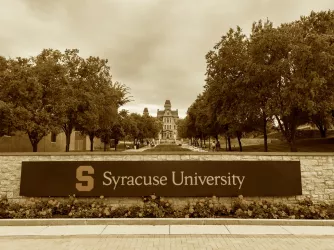Table of Contents
Victory: Indiana U. Dismisses Conduct Charges Based on Student's Single Email

There’s good news to report from Indiana University - Bloomington (IU) this month after FIRE successfully stepped in to correct the university on a dangerously broad application of its “Personal Misconduct” policy to a student’s protected speech. FIRE commends IU for righting the ship here, and hopes other universities with similar policies will take note.
Back in December, IU undergraduate Andrew Hsu, no doubt wanting to escape the cold confines of the Bloomington campus and get a jump start on winter break, was disappointed by the scheduling of his Introductory Psychology exam, which wasn’t scheduled until the evening of December 20. Frustrated by having to remain on campus (his was among the very last of the fall semester’s finals administered), Hsu wrote his professor an email (PDF):
I just want to take a moment to personally thank you for the $500 or so that you cost me for having the final on Friday. You saw that many people had issues/ conflicts with the final in lecture, yet what did you do? You decided to blow over it like nothing happened. You as an instructor have the power to change these kinds of things. Excuses such as not having enough proctors etc are not acceptable from a capable person of such high caliber as yourself. Where there is a will, there is ALWAYS a way. Next time or in the future I hope you will take student opinions and ideas seriously, and not blow them off like you did in lecture. ... I expect a professor to make an effort to understand that students have lives outside of academia, just as you have a family and other obligations that need to be fulfilled.
Most would recognize this expression as rude, and Hsu would be one of them; indeed, he regretted the email’s harsh tone. Rudeness, however, doesn’t excuse what happened next. On January 14, Office of Student Ethics Assistant Director Leila Faranesh emailed Hsu, informing him of an administrative report “concerning your alleged involvement in actions which are against University regulations.” Specifically, Hsu was suspected to have violated the university’s policy concerning Personal Misconduct on University Property, defined as:
Disorderly conduct, including obstructive and disruptive behavior that interferes with teaching, research, administration, or other university or university-authorized activity.
The sole cause of the charge given was the “inappropriate email” Hsu had sent on December 21.
Yikes. Hsu’s email may have been intemperate and regrettable, but it was still protected speech. What’s more, IU charged Hsu under a policy designed with unprotected conduct in mind. Applying such a policy to an act of protected expression raises all kinds of concerns for the state of free speech at IU. The university held a judicial conference for Hsu to answer the charge on January 22. Hsu was allegedly informed at this hearing that IU would not impose any sanctions at that time, but it was keeping the charge “open” in case of other potential violations, which could lead to a heightened punishment. This prompted a letter from FIRE to IU on January 31, in which we clarified:
Hsu’s email plainly did not constitute misconduct. IUB’s “Personal Misconduct” policy applies to conduct that “interferes with teaching, research, administration, or other university or university-authorized activity.” It is at best highly dubious that Hsu’s December 21 email could constitute such interference, especially since IUB’s fall term ended on December 20. Even if Hsu’s email could be considered a disruption—which it simply cannot, under any reasonable reading of his communication—there was no university business for the email to disrupt. ...
Further, the fact that IUB has employed a policy crafted to deter disruptive and disorderly conduct (repeated and aggressive disruptions of class lectures, for example) to investigate or punish protected speech, in this case a single email, is deeply chilling. IUB’s action subjects large swaths of student expression to unconstitutional investigation and punishment and dramatically lowers the threshold speech must clear to become targeted for discipline. All a faculty member or administrator must do under this untenable precedent is to complain that someone’s speech caused even a slight amount of distress or discomfort, and the speaker may be subjected to investigation and punishment. This is an unacceptable and unconstitutional result.
FIRE asked that all charges against Hsu be dismissed and the case be permanently closed. Fortunately for FIRE, for Hsu, and for all IU students, the university acted to clear Hsu of all charges. After initially informing FIRE on February 7 that the university was performing a thorough review of the case, Indiana University Associate General Counsel Angela D. Adams informed FIRE in a letter dated February 19, “We have confirmed with Mr. Hsu has been sent a letter ... indicating that the charges in this case have been dismissed and there is no pending matter related to this case. There is no threat of future disciplinary action as this matter has been closed.”
FIRE is, of course, very pleased with this outcome, and we commend IU for getting it right so quickly. However, Hsu should never have been charged with any violation of IU’s student conduct policies in the first place—much less one plainly designed to regulate conduct and not mere speech. FIRE has commonly seen variations of “misconduct” policies employed as a catch-all to punish protected expression that has caused offense to other students, faculty, or administrators. At the University of Georgia, for example, student Jacob Lovell was infamously charged with “disorderly conduct” on the basis of an email complaint to the university’s parking services division. A Clemson University student found himself in a similar situation on the basis of an email to a Clemson administrator.
As this case highlights, such uses of misconduct policies are unconstitutional at public colleges and universities, and hopefully IU’s acknowledgement of this sends a strong signal to other universities that these kinds of abuses aren’t going to fly. If Hsu’s email was lacking in civility—as Hsu himself readily admits—there are far more productive, and constitutional, ways to turn such incidents into teachable moments. In the end, the misapplication of its policies led to a teachable moment for IU itself, and FIRE commends the university for taking the right lessons from it.
Recent Articles
FIRE’s award-winning Newsdesk covers the free speech news you need to stay informed.

From the UK to Germany to Singapore: Police are watching what you post

Wisconsin school district mulls unconstitutional ‘hate speech’ policy

A cartoon, a mustache, and a witch hunt: The perils of bias reporting at Syracuse University
